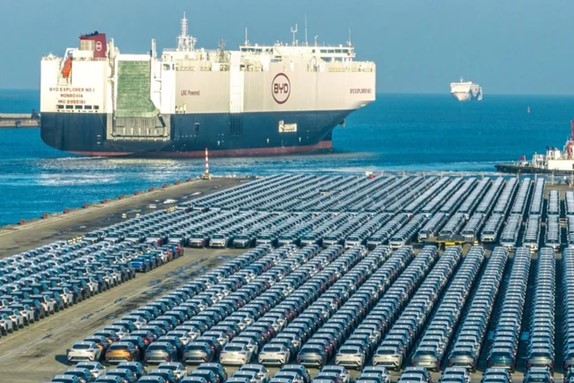September was a volatile stock market month that started badly, but gradually became more upbeat. The bouncer was China, which launched a hefty stimulus package just before the end of the month, sending its stock markets up 20-25% in a matter of days. This was the biggest rise in 16 years, but still investors will not fly the Chinese flag. For that, losses over the past 3 years have been too substantial.
MSCI China index of the last 5 years

So, what plans did the Chinese authorities announce that got the stock market so excited? First of all, there was a series of interest rate cuts: in particular, the 0.5% drop in mortgage rates for existing mortgages is meant to boost the real estate sector. Given the state of that sector, this is no luxury. For second homes, the compulsory equity was also reduced from 25% to 20% of the purchase price. In addition, banks now also must set aside less capital when providing credit. This too provides an incentive for economic activity. And finally, consumers get subsidies for trading in old cars for new electric ones.
Still, the question remains: with the announcement of such a stimulus, how does one get investors excited enough to cause such a huge share price rise? Firstly, by probably placing massive buy orders in the market yourself. For that, the Chinese government has a special buyback fund of around US$270bn. The timing of the announcement was perhaps even more important: right before the end of the month, just before stock markets were to be closed for almost a week for ‘Golden Week’, in early October. Thus, there was only Thursday 26, Friday 27 and Monday 30 September to hedge any short positions. This led to violent stock market scenes those days, with trading having to be halted several times. That’s how big the trading volume was with the resulting volatile price-moves.
Whether this optimism will soon translate into an economic recovery in the same way remains to be seen. We have been slightly overweight China in the portfolio for some time. Not because we saw this stimulus package coming, but because this stock market was among the cheapest globally. The Chinese authorities themselves may also be a bit fed up with the whining about their poorly performing stock markets. It radiates negatively on the country anyway, so it was time to do something about it.
Enough about China, how are other regions doing? Be it Europe or the US, everywhere you find pictures like the one below: huge port areas full of new (electric) cars, for which there seems to be too little demand.
Endless port areas full of new cars, especially in Europe

Now that the political winds have changed almost worldwide and subsidies have been phased out or disappeared and import duties and trade conflicts are the order of the day, consumers are giving up. They are mainly waiting to see what happens. Globally, producers are facing surpluses and are temporarily scaling back car production. On top of this comes the strike of 47,000 dockworkers on the US east coast. If it lasts more than 1 week, it will disrupt global trade.
Now I hear you thinking: what about all the major conflicts, in the Middle East and Russia/Ukraine? Don’t they cause economic problems? Not necessarily. These seem to cause mostly human suffering. The defence industry is working overtime to meet all the demand for weapons. You might wonder if this kind of economic growth makes one happy, but the fact is that hundreds of billions are involved here. Sectors that, incidentally, are often and/or partially excluded from investment.
For the defence industry, this has been a problem for years. Especially with all the geopolitical tensions, they would love to be seen as an ordinary industry, in which everyone is free to invest. Especially the pension funds and insurance companies in Europe are at odds here. They do not consider it the right thing to invest in weapons. But then how do we build all these new factories in these worrying times of war?? No one has an answer to that yet.
We prefer to look in a different direction. There we see lower inflation rates, interest rate cuts across a broad front of countries with upbeat price movements in both equity and bond markets. We are hoping for Goldilocks, you know, a period when the economy lands gently on its feet and then grows through, the ‘soft landing’ that stock markets love so much. One Golden Week does not make an economic spring, the Chinese know that too, but it was still very nice, such a price jump, after so many dark times.
BY: WOUTER WEIJAND, Chief Investment Officer


